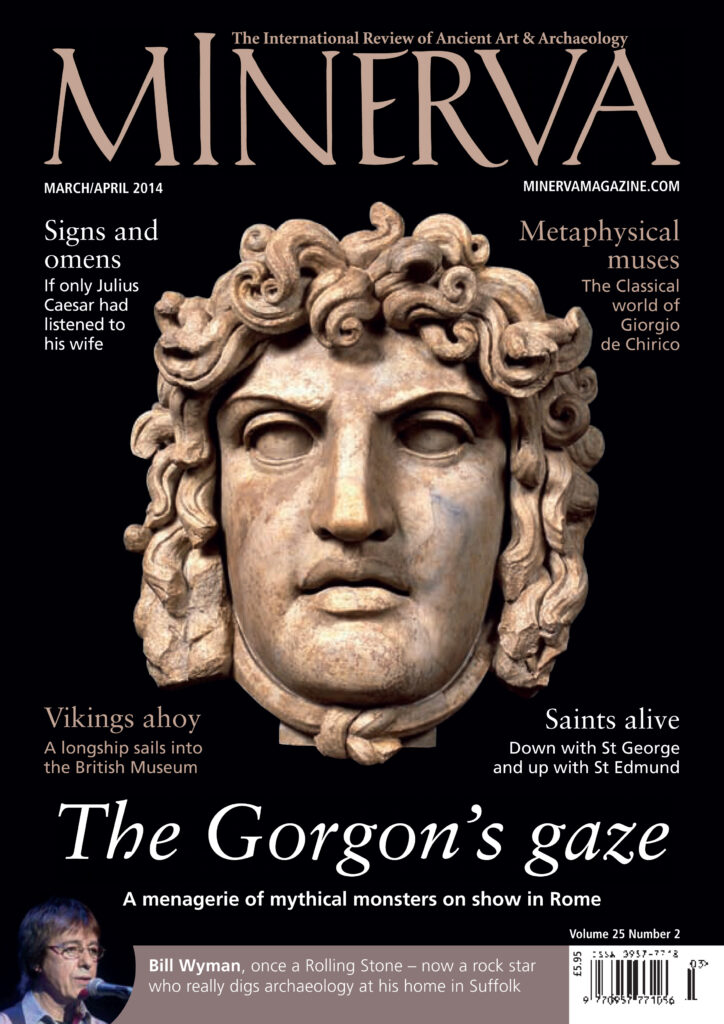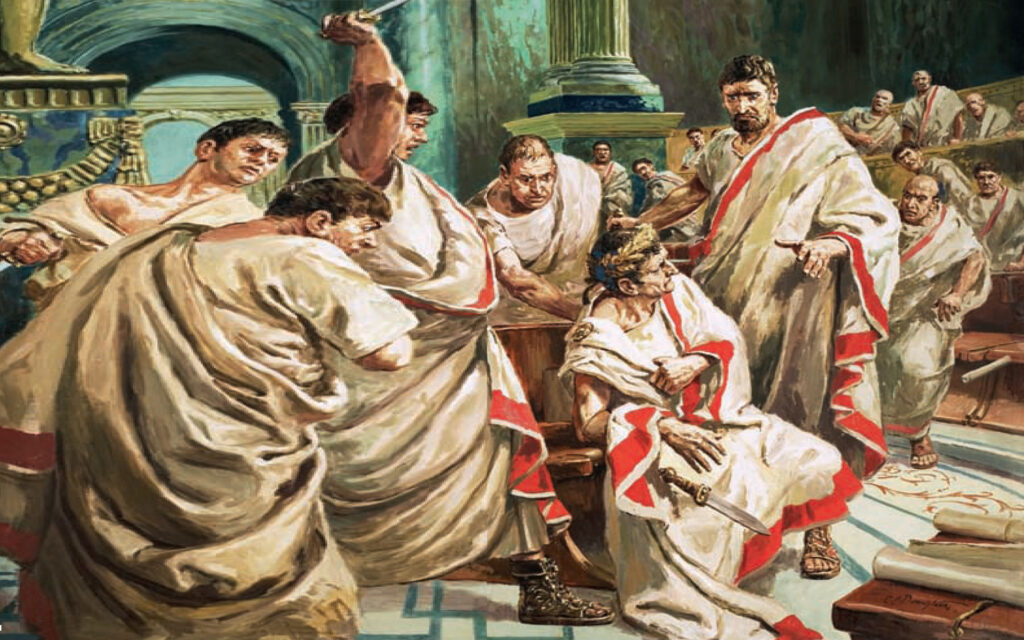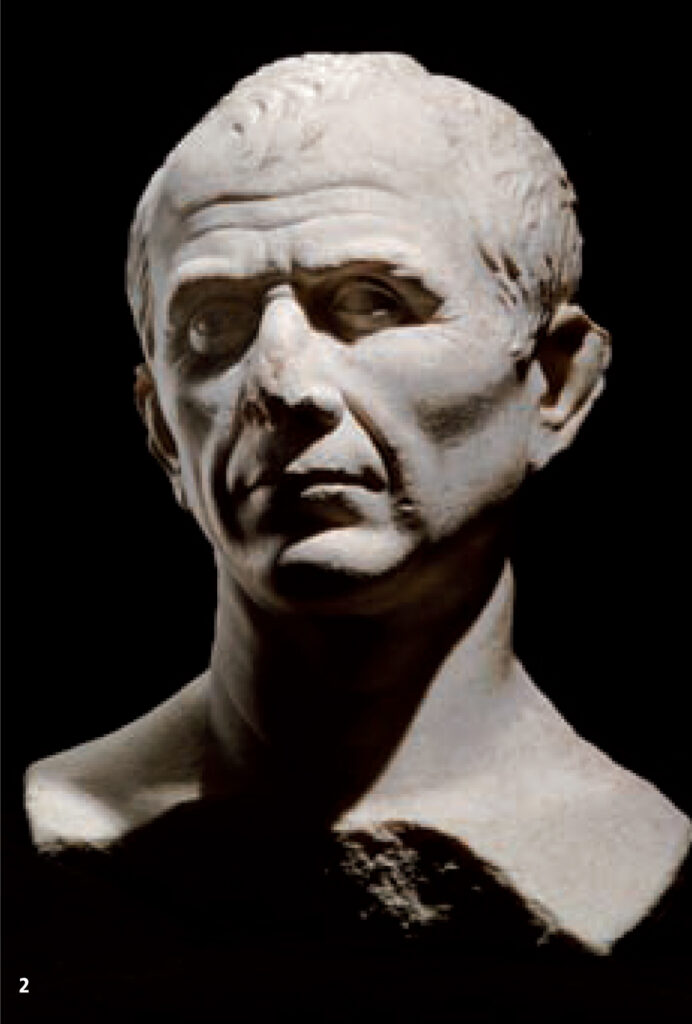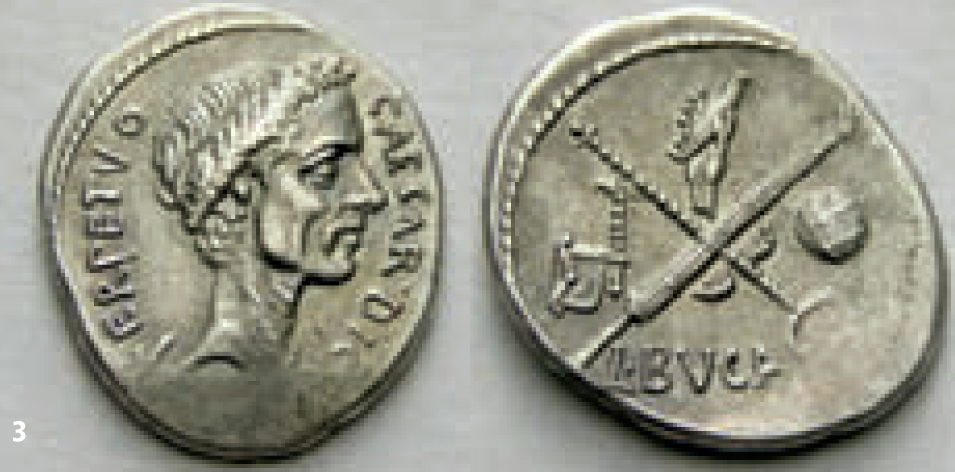ROMAN HISTORY


Victor Zugg reimagines the fateful day when, disregarding numerous ill omens, Julius Caesar insisted on going to the Senate, where a band of conspirators were waiting to assassinate him
Reprinted courtesy of Minerva Magazine, Current Publishing. Article first appeared in the March/April 2014 Edition. London, UK

The Death of Julius Caesar by C L Doughty (1913-85), gouache on paper. In this 20thcentury depiction of the murderous event of 15 March 44 BC, the wounded Caesar is shown surrounded by knife-wielding conspirators, sliding from his throne on to the cold marble floor. Private Collection/ Bridgeman Art Lib
In a matter of seconds, the great Caesar went from being a near god at the peak of his power and popularity to a mere mortal gasping his final breaths – and, as his warm blood stained his robe and spread over the cold marble floor, he had time to contemplate the pain. But what hurt most? Was it the sudden realisation that his death would not be at the hands of an enemy in battle but as a result of the treachery of those he held most dear? Was it the comprehension that he would be unable to complete the many works and military campaigns he had planned? Was it his departure from those he loved, primarily his wife Calpurnia? Was it the searing physical pain of the multiple stab wounds – some say there were 23, others 35? Or was it the deep regret he must have felt for ignoring all the warnings and omens?
Today there exist several accounts of his murder written by ancient historians: Nicolaus of Damascus (b. 64 ); Marcus Velleius Paterculus (19 BC-AD31); Lucius Mestrius Plutarchus (AD 46 -120). Gaius Suetonius Tranquillus (AD 69- 122); Cassius Dio (AD150-235). Nicolaus of Damascus was the only one alive at the time, but even his account, part of his Life of Augustus, was written much later. Despite the time lapse, the consistent nature of these accounts indicates that they were based on a common source – earlier accounts, perhaps accounts of accounts, by someone, perhaps more than one, who was there and witnessed the murder.
It was 15 March, the Ides of March, 44 BC. Julius Caesar was in his mid-50s. He had travelled that day, probably in the late morning, from his house (the domus publica) in the Forum to the Senate’s temporary meeting place in the portico of Pompey’s Theatre to the west, outside the city’s boundary. The Senate normally met at the Curia, located in the Forum, but, on that day, it was not available as the building was being renovated.

Having been elected Pontifex Maximus (chief priest) in 63 BC, Caesar was entitled to reside in the domus publica, which at that time was part of the House of the Vestals, between the circular Temple of Vesta, part of which still stands today, and the Regia, adjacent to the Via Sacra. The Regia was an administrative building, a depository for wills and important papers where Caesar spent many of his working hours.
He may have walked the kilometre or so to Pompey’s Theatre, or he may have been carried there by litter, probably the latter, as he was not feeling well that day and also because he was the first citizen of Rome, having been named dictator for life a month earlier. But however, he travelled, we can assume that, despite many ill omens, Julius Caesar did not expect to die when he did and especially not at the hands of men he had trusted, supported, and even protected. But he should have known, and would have known if he had heeded the omens.
According to Suetonius, some months earlier, Caesar had ordered that sections of Capua, a township outside Rome, be demolished to make way for new housing. While this was in progress, workers discovered a tomb in which there were ancient vessels and a brass tablet. The tomb was said to be that of Capys, the founder of Capua, and the tablet bore a curse in Greek which read: ‘Whenever the bones of Capys come to be discovered, a descendant of Iulus will be slain by the hands of his kinsmen, and his death revenged by fearful disasters throughout Italy’.
Now Caesar was of the Julia, or Julians, clan and, according to the Roman poet Virgil, a descendant of Ascanius, also called Iulus or Julus, whose father was Aeneas, whose mother, in myth, was the goddess Venus. Aeneas was third cousin to King Priam of Troy and, after the fall of Troy, Aeneas led Trojan refugees to Italy and founded Rome.
Suetonius went on to relate how the story of the brass tablet was circulated by Caius Balbus, a close friend of Caesar’s, and also how the horses on which Caesar crossed the Rubicon stopped eating and shed tears just prior to his death. Days earlier, too, the soothsayer Spurinna had warned Caesar that some danger would befall him before the Ides of March passed.
The day prior to the murder, various birds pursued a wren with a sprig of laurel in its beak into Pompey’s Theatre and tore the bird to pieces. The night before his death Caesar himself dreamed that he soared above the clouds and at one point joined hands with the god Jupiter. His wife, Calpurnia, also had a doom-laden dream in which the gable, or pediment, of their house collapsed and, worse, that Caesar had been stabbed and came seeking refuge in her bosom. Both she and his friends begged him not to go to the Senate meeting that day. His doctors also recommended that he stay at home, since he was suffering from vertigo, an ailment that often afflicted him. So why did he ignore the omens and the appeals of his wife and friends?
Caesar was probably lulled into a false sense of security by the many rewards and privileges that had recently been heaped upon him. Perhaps these were given to him for this very purpose, especially since they came from those who secretly harboured the most ill will towards him – Marcus Brutus, Gaius Cassius, Decimus Brutus – although it is thought that, in the end, between 60 and 80 senators participated in the conspiracy.
Since it was well known that Marcus Brutus’s mother, Servilia Caepionis, had maintained a long relationship with Caesar, it was rumoured that he may have been Caesar’s son. This is possible but seems unlikely, since Caesar would have been only 15 at the time Brutus was born. But if it is true, it might explain why Caesar favoured Brutus even though he had sided with Pompey in the recent civil war.
The honours granted to Caesar by the Senate, much encouraged by Marcus Brutus and Gaius Cassius, were so great in number that they should have given rise to suspicion. The historian Cassius Dio listed them. First, Caesar was named father of the country and the title appeared on coinage. Then a vote that Caesar’s birthday be celebrated with a public sacrifice was passed. Next, they made Caesar sole censor for life and gave him immunity equal to that of the tribunes. They authorised that his tomb should be located within the city boundaries. Caesar was also allowed to wear the garb of triumph, purple robes like that of kings of old and a laurel wreath, and always to sit in his stately gilded chair. At the Games he would be seated with the tribunes and annual festivals were to be held in his name. The Senate ordered, furthermore, that statues of Caesar be erected, and that he wear a crown in recognition of his stature and be made dictator for life.

After all this it is not surprising that Caesar believed that he was well loved and felt so secure that he dismissed his personal guard. Ironically, it was his acceptance of these honours and privileges that fed the contempt that grew among the 80 or so senators and drove them to participate in the conspiracy.
But let us return to the Ides of March. Because of the many omens, the appeals from his wife and friends, and because he was not feeling well that day, Caesar at first decided to remain at home and not to go to the Senate meeting. The senators had gathered at the portico at dawn and, when it became evident that Caesar was not coming, they sent Decimus Brutus to his home to persuade him. Decimus made light of the omens and reminded Caesar that he had called for the assembly himself and that important matters needed to be discussed. Then, despite Calpurnia’s pleading, her husband changed his mind and decided to attend.
Along the way, when Caesar met Spurinna the soothsayer he chided him, saying that his prophecy was obviously wrong, since the Ides had come and no harm had befallen him. But the historian Dio said that Spurinna replied: ‘Ay, it is come, but is not yet past.’ Further along, another person (who is not identified by the historians) approached Caesar with a note and told him that it pertained to him personally and that he should read it as soon as possible. But Caesar simply placed it, unread, with his other documents and moved on. Later, after his death, the note, which was still among his papers, was found to contain full details of the plot to kill him and the conspirators involved.
The final omen came from the augurs, the priests whose duty it was to interpret signs in order to foretell the will of the gods. Prior to Caesar’s entry into the place where the Senate was meeting, they sacrificed animals and studied their entrails. The results were extremely inauspicious, and the augurs immediately reported the fact to Caesar, but he chose to ignore it. Nicolaus of Damascus wrote that Caesar turned away from them in disgust to face west, where the sun would set, whereupon the augurs interpreted this, too, as a dark omen. Caesar’s friends begged him to postpone the meeting, but Decimus Brutus approached him once again and, reminding him of the high regard in which he was held, managed to persuade him to ignore the omens.
At this time the number of senators probably totalled around 600. On this day there was a quorum of hundreds, and all of them stood as Caesar entered the portico and stepped up to his seat of honour. As consul of Rome that year, Marcus Antonius convened the Senate and was supposed to be there, but he was deliberately delayed, engaged in conversation at the door by Gaius Trebonius, a military commander, politician and, more importantly, a co-conspirator. The faithful friends who had accompanied Caesar were unarmed and greatly outnumbered by the conspirators who, with daggers hidden in their robes, gathered around Caesar as he sat down.
Tullius Cimber approached him first, looking as though he intended to make an appeal, probably for the return of his brother, whom Caesar had exiled. Suetonius reports that Caesar waved him off, but then Tullius seized his robe at the shoulder, thus preventing him from rising. Caesar is said to have exclaimed, ‘Violence is meant’ – but by then it was too late. Standing close behind Caesar’s chair, Publius Servilius Casca Longus struck first, probably aiming for the neck, but he missed and instead jabbed Caesar in the left shoulder just above the collar bone, causing a slight wound.
The historian Plutarch reports that Caesar grabbed the handle of Casca’s dagger and cried out in Latin: ‘Villain Casca, what do you?’ Then, according to Suetonius, Caesar stabbed Casca in the arm with a stylus. Casca called out in Greek to his brother, Gaius Servilius Casca, to help him as Caesar sprang up and attempted to defend himself, whereupon Casca’s brother stabbed Caesar in the side. Gaius Cassius Longinus slashed Caesar across the face and Decimus Brutus stabbed him in the thigh. Eager to strike again, Cassius Longinus missed and instead wounded Marcus Brutus in the hand. Lucius Minucius Basilus likewise missed and ended up stabbing Rubrius Ruga in the thigh. Pandemonium ensued as the conspirators continued to hack at Caesar, while those senators not involved ran terror-stricken from the portico. When Caesar realised that he was totally outnumbered and that it was futile trying to defend himself, he pulled his robe up over his face and slipped down on to the floor.
Claiming to offer the most accurate account, the historian Dio reported that Caesar said nothing as he died, acknowledging that others reported that when Marcus Brutus struck with a serious stab, Caesar said simply: ‘Thou, too, my son?’
So, Julius Caesar lay dead at the foot of a statue of Gnaeus Pompeius Magnus (Pompey the Great), an effective general, three times a consul and his former ally. He had become Caesar’s nemesis in the civil war of 49-48 BC. Caesar chased Pompey into Egypt, where he was killed on the orders of the young king, Ptolemy XIII, who thought that this would serve Caesar. But, Pompey may have had his revenge in death, as Brutus and Cassius, two of the main conspirators, were his allies during the civil war. Defeated and forced to accept Caesar’s mercy, they had never forgiven him for this humiliation.
Caesar’s body was left untouched until, later that day, three slaves carried him home, wrapped in his blood-soaked robe, his arm dangling lifeless over the edge of the litter. Following his funeral a few days later, the grief-stricken people piled together tables and benches from nearby shops and burned his body.
Two years later the Senate deified Caesar and began to construct a temple on the spot where he was cremated. Augustus dedicated the completed temple in 29 BC. Fresh flowers, a tribute to Caesar, are still strewn inside what is left of it today.
The omens foretold the death of a man but not of his cause, for while Brutus and Cassius acted in part to maintain the Republic, it was Caesar’s death that ushered in the first emperor – Gaius Julius Caesar Octavianus, later called Augustus – the great-nephew Caesar had adopted in his will. Augustus went on to consolidate power, further reform Roman society, and expand the Empire just as Caesar himself had intended to do.
Minerva/March 2014